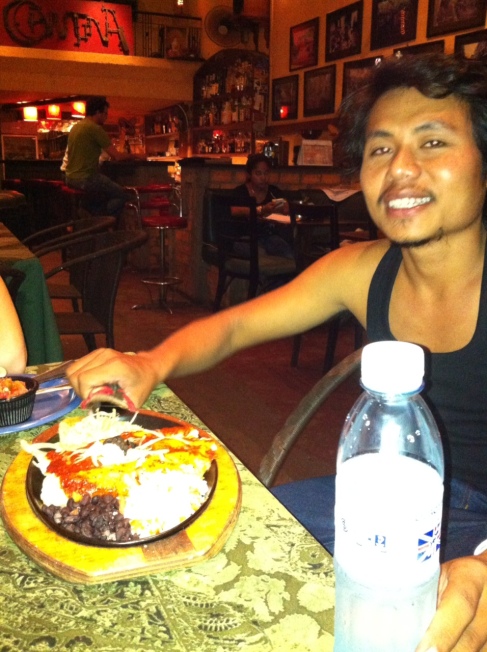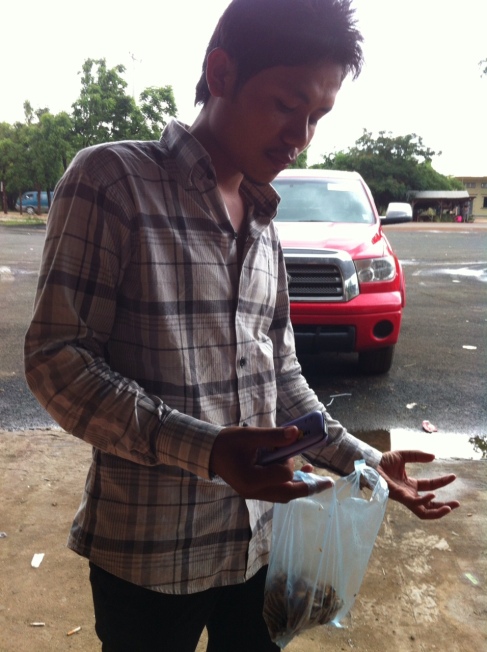Profile: Agugu
Good news everybody! I thought of a way to breathe a little more inspiration into my blog, and it’s very simple: Khmer people. One large reason I wanted to come back here was to learn more about Cambodians, their problems, their dreams, their culture. So I’ll do periodical “profiles” that share the stories of some of my interesting friends, acquaintances, and co-workers throughout this year. My first profile is on Agugu.
Outside of Okay Guesthouse, I meet him. “Hey lady, you need a driver?” Yessir, in fact I do. He takes my friend Becca and I around the city in his tuk-tuk. When we’re done and he drops us off at our place, we sit in his tuk-tuk just a while to chat. He tells us he’s the same age, 24. He wants to learn more English so he can get a better job. We exchange phone numbers just in case we ever need a driver again.
Fast forward two weeks and Agugu and I are poouk-macks, good buddies. We eat together a lot. He comes over to my house and we chat, I make noodles. He calls me “sray skohm,” (skinny girl) and I call him “bro skohm,” (skinny boy). I visit him at the guesthouse where he lives and works and we shoot the breeze. We try different restaurants–his favorites so far are buffalo wings, pig stomach soup, and enchiladas.* Once I even slept in his tuk-tuk for a quick nap.
Agugu was born in Prey Veng Province with one older sister and two younger brothers. His mother sells sugar cane, but his father cannot work due to a chronic illness. Without his father’s income and with the pressing need for medicine, as the oldest boy in the family Agugu moved to the city to work as a moto driver when he was only 16. Whenever he makes money, he sends it back to his family to pay for the medicine as well as his little brothers’ education.
His brothers’ education is very important to Agugu, but most of the money goes to his father’s treatment. After his dad tried several different medicines, including traditional Khmer remedies, he was only getting worse. A few years ago, Agugu drove his father to a skilled doctor to try to figure out what was wrong. He paid him $230, several months’ or even a year’s worth of wages. The doctor performed a few tests but discovered nothing. More tests were needed, but Agugu didn’t have any more money. The doctor refused. Agugu begged him, “You are a doctor! Aren’t you supposed to help people get better?” His dad lied there on the bed, unable to move, practically comatose, but Agugu had to take him all the way back home with no answers, no medicine, and no money.
Still, the limited medicine they have been able to afford helps. Agugu says, “If I didn’t work and maybe went to school instead, my father would have died a long time ago.”
Agugu gradually saved enough money to buy a tuk-tuk, and now he works in a guesthouse too. He wakes up at 5:30am every day to work shifts cleaning the guesthouse, and drives tourists around in between. The guesthouse doesn’t pay him, but they provide free room and board so he can save more money.**
It’s a rough life, but being a driver has its benefits. Agugu seems to know everything and everyone in the city, and most of this comes from knowledge shared by his fellow tuk-tuk drivers. The other drivers have taught him most of the English he knows and much more. He gives us Cambodian history lessons over dinner, tells us about the political situation. The connections are plentiful: Agugu seems to have a “guy” for everything. He knows how to take tourists to the military base, pay a small bribe to enter, and use the weaponry. One tourist paid for Agugu to shoot a coconut with an AK-47: one bullet for $40, the coconut for $1. He drives my roommates, Abby and Art, to and from work every day, and they took him on a trip to Ratanikiri.
Still, Agugu’s life is not fair and he knows it. He has the typical anger of a 24-year-old male who’s had it rough. He sees rich people in the city and loathes the way they look down on poor people. He has a few friends that became rich, and now they completely ignore him. I ask him if he thinks this is a side effect of Buddhism and the belief in Karma: if you have a good life and money now, you must have been a good person in your past life. He replies, “No, I don’t know. I don’t care. I only have time to worry about my life now, not the next or the one before.”
Agugu has big dreams for this life too. First he wants to learn Korean and save up enough money to work in a factory in South Korea. He knows it will be hard work but he can make more money than driving his tuk-tuk. Once his dad gets good medical treatment, his brothers finish their education, and Agugu builds up his savings, he wants to come back to Cambodia to start his own business, maybe a restaurant and a guesthouse.
Agugu dropped me off at the airport on my way back to visit the states. I asked him if he wanted anything from America. He got a twinkle in his eye and said, “Yes, I want a diamond! A big American diamond” I laughed, and before I could reply he realized what he really wanted: a black NY baseball cap. Okay, I said. I’ll try to find one. We said goodbye and I was waiting in line to get my boarding pass when he called me on the phone. He sounded so excited. “Also my head is bigger than your head! Don’t forget! A black one! See you in a week!”
I really hope I can find that hat. It may be the best gift my good buddy’s ever gotten.
*I told you, Phnom Penh has a wide variety of food. Agugu still loves Khmer food the most though–the infamous, pungent durian fruit is of course his favorite.
**This is hard work, but it’s a beneficial set-up as most tuk-tuk drivers live directly our of their vehicles.
Having some crickets

